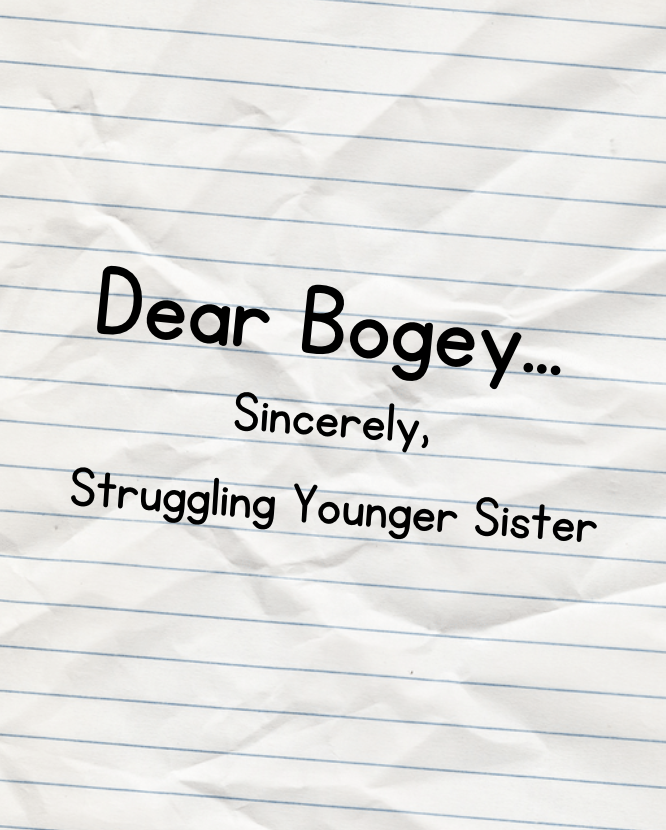
Dear Bogey,
Families can be hard to deal with sometimes, and I am having a hard time connecting with my older sister recently. We used to be very close when we both lived at home, but ever since I moved away for college, it has been hard to stay close. I don’t want to lose the relationship that I have with my sister, but she is making it hard for me to want to keep our relationship. She is my older sister, so she thinks that she has to be a mother to me when that isn’t what I want at all. I just want to have a sister that I don’t feel like I have to hide stuff from. The last time we hung out we had the biggest fight that we have ever had, and things haven’t been the same as before. She got mad at me because I didn’t tell her that I was going somewhere, and as her younger sister, she thinks I am still a baby and can’t go or do anything on my own. This is very frustrating to me because I am now a young adult and would like to be treated like one. I am not sure how to get our relationship to how it was before I grew up, and I no longer need a “second mother” to take care of me and just have an older sister. Please tell me what I should do to show my older sister that I am ready for her to treat me like a respectable adult and not the child she sees me as.
Sincerely, Struggling Younger Sister
Dear Struggling Younger Sister,
I feel your pain. Families are so complex and involve a lot of parts that need to work together for the family to function properly. Siblings play a unique role in our family and when you think about it, they are usually the longest relationship we will have in our lives. So, like any other kind of relationship, fights, arguments, and trials are bound to occur.
It sounds like you and your sister are having a conflict with your roles in the family. Everyone, whether they realize it or not, serves a role in the functioning of a family, whether that be the jokester or peacemaker (Floyd, 2021). In your case, your sister has taken on the role of being the “second mother.”
You need to know that as both of you age, your whole relationship is going to change. Contact with each other might not be as often, maintaining the relationship will be more voluntary, and roles are going to adjust (Turner & West, 2018). As much as you may want your relationship to look the way it did before you grew up, there is a reasonable chance that this relationship is supposed to look different now that you both are emerging adults. With that being said, communication is necessary to get on the same page with your sister and figure out how you both can better the relationship. According to family therapist Karen Gail Lewis, “figuring out each sibling’s impact on one another can increase our empathy and alter deeply etched ways of relating” (Flora, 2007). Telling your sister how you feel and explaining why you feel that way may help her understand that her role of being the “second mother” may not be necessary.
Expressing your emotions with your sister may feel nerve-wracking, and you might not know where to begin. It is essential when you communicate with her about how you are feeling that you use I-statements rather than you-statements. You-statements can be taken as negative because they blame the other person for your emotions, without a direction for change (Floyd, 2021). Instead of using statements like “You’re always trying to mother me” or “Why does it matter? You’re not my mom,” try using I-statements like “I feel undervalued whenever I am not treated like the responsible adult that I am.” These kinds of statements are more difficult to use, especially in the moment, but they will be more beneficial in reaching your sister.
Telling your sister how you feel will also allow you to listen to her side of the issue. She may have certain reasonings behind her behavior that may help you see a different perspective you had not realized before. This is a form of empathic listening that will improve your perspective-taking, or the ability to understand a situation from the other point of view, and have an empathic concern, or the ability to identify how someone else is feeling and then experience those feelings yourself (Floyd, 2021). No matter how much you may not want to reason with her on this issue, listening will expand your relationship because you are learning how to respect her opinion and increase your empathy with one another. Additionally, this will help figure out the impact the two of you can have on each other.
Having a sibling in life is like having a lifelong friend, and we should be prioritizing making the relationship a healthy one. There will be days where you may hate each other and other days where they’re just the person you need to confide in. So, don’t let these challenges hurt you. Work on communicating how you feel with each other, and bring up fun memories or activities that remind you of why you love each other so much. Life is too short to let the longest relationship we may have in our life become a troublesome one.
With brotherly love,
Bogey
References
Floyd, K (2021). Interpersonal Communication (4th ed.). McGraw Hill Education
Sussex Publishers. (n.d.). Can grown-up siblings learn to get along? Psychology Today. Retrieved November 2, 2022, from https://www.psychologytoday.com/us/articles/200703/can-grown-siblings-learn-get-along
Turner, L. H., & West, R. L. (2018). Perspectives on Family Communication. Dubuque: McGraw-Hill Education.
